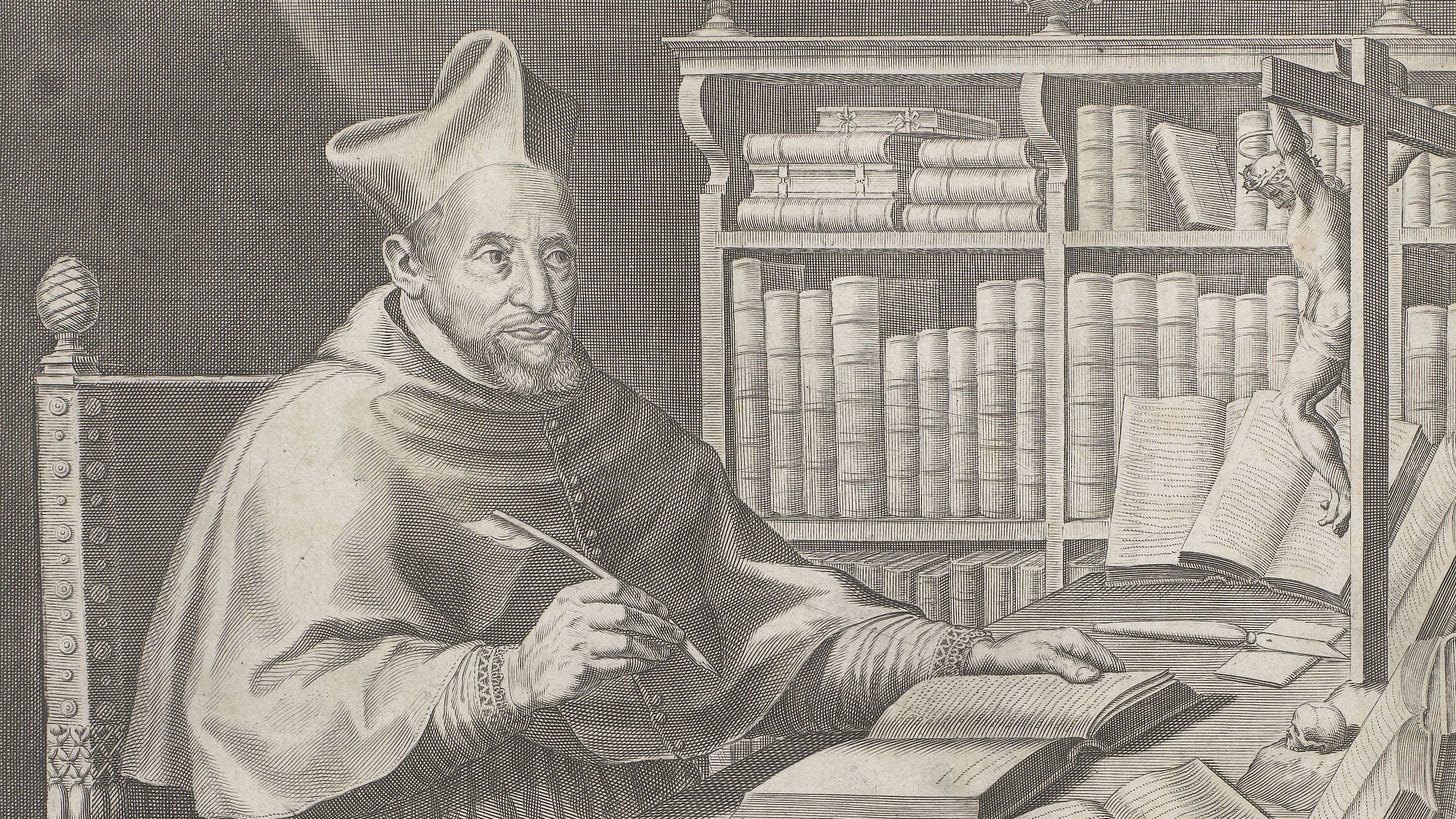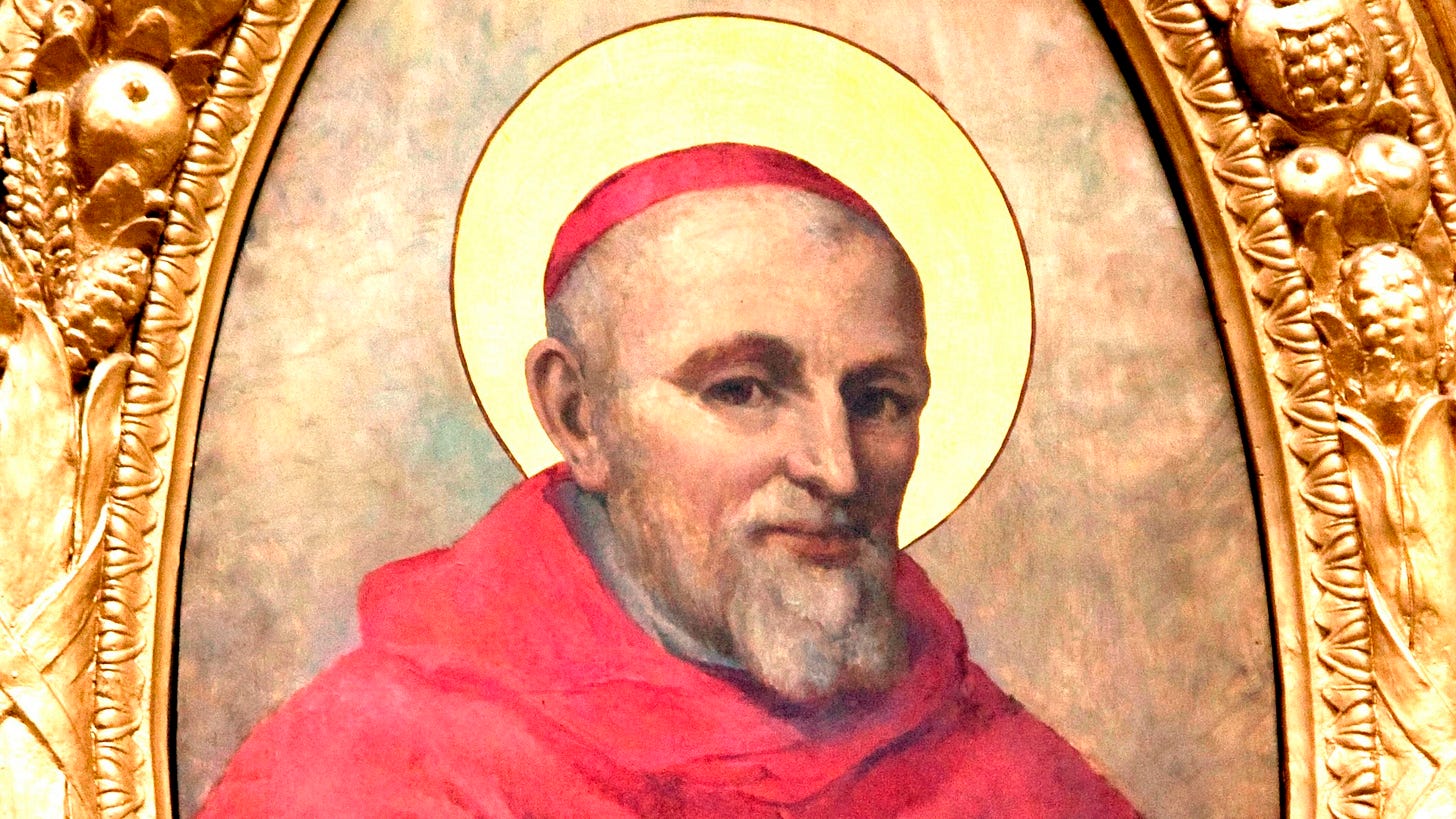Top 5 St Robert Bellarmine articles
Check out our top five articles on the Church's Doctor of Controversy—and of the Papacy.

Check out our top five articles on the Church's Doctor of Controversy—and of the Papacy.
The Feast of St Robert Bellarmine
May 13th is a curious date. It is the anniversary of…
The first apparition of Our Lady to the children of Fatima in 1917
The consecration of Eugenio Pacelli (Pius XII) in 1917
The feast day of St Robert Bellarmine
It is also, incidentally, the wedding anniversary of Mr and Mrs S.D. Wright.
Is there a link between these three dates? (Or even the fourth?)
The alignment is at least suggestive of a link between the message of Fatima, the position of Pius XII and the ecclesiology of St Robert Bellarmine. There are indeed parts of the message of Fatima that become a lot clearer when considered in light of Bellarmine’s ecclesiology.
As for the exact nature of this link: we can have ideas, even if the truth does not become clear until the future.
In the meantime, we are presenting a curated selection of our favourite articles on the Doctor.
Following the articles, we have included some comments on Bellarmine’s significance in our day.
Top Five Bellarmine Articles

FIRST ARTICLE: ‘Ipso facto’: Bellarmine's 'five opinions' on the heretic pope question
Bellarmine’s definitive treatment demolishes the notion that a manifestly heretical pope requires deposition—showing instead that such a man ceases to be pope by his own act. This article presents the full text and correct interpretation of his “fifth opinion,” clarifying widespread errors and distortions.

SECOND ARTICLE: 'Anathematise those who teach new doctrines' – St Robert Bellarmine
If a pope can fall from office for manifest heresy, how are the faithful to recognise it? Bellarmine answers: by the contradiction of doctrine—and commands the faithful, even the simple, to anathematise those who teach novelty. This key text dismantles the myth that Catholics must passively accept doctrinal novelty from apparent authorities.

THIRD ARTICLE: 'Resisting the pope?'—Bellarmine on doubtful and tyrannical popes
Some quote Bellarmine to defend “resistance” to a heretical pope. But these texts concern wicked or doubtful popes—not heretical ones, and so are not relevant to our current situation. But Bellarmine is explicit: heresy severs a man from the Church ipso facto.
Honourable mention: The famous “resistance quotes” cite these Cajetan and Turrecremata theologians—and their texts only reinforce the point. Neither claims a heretical pope retains office. Their texts reinforce, not undermine, Bellarmine’s true position.
FOURTH ARTICLE: What St Robert Bellarmine really taught about a heretic pope losing office 'ipso facto'
Many accept Bellarmine’s “fifth opinion” in name, while subtly denying what it means. Da Silveira lays bare the confusion—showing Bellarmine held that a manifest heretic loses the papacy in fact, not by judgment or decree, but by becoming visibly severed from the Church. No trial. No declaration. Just the truth manifest.
FIFTH ARTICLE: Papal elections without the cardinals? St Robert Bellarmine says yes.
Some claim a long vacancy or loss of the cardinals makes succession impossible. Bellarmine disagrees. If all electors disappeared, the right of election would return to the Roman clergy and neighbouring bishops—with the broader episcopate overseeing. The Church is not helpless. Bellarmine demolishes the “dead end” objection.
If you enjoyed this article, you’ll love these mugs:
The WM Review ‘The Fifth’ Mug
The WM Review ‘Ipso Facto’ Mug
With that in order, let’s consider a few points about Bellarmine himself.
St Robert Bellarmine and ecclesiology
St Robert’s teaching on the Church herself and the Roman Pontiff is highly authoritative. To some extent, he could be said to be “the” doctor of controversy and by extension, ecclesiology.
Although he by no means invented his own theory of ecclesiology – which is very evident even in early catechisms and before – it was his systematisation that was adopted by the Church at Vatican I, in encyclicals such as Satis Cognitum, Mystici Corporis Christi and elsewhere, and by the general body of theologians.
It is well known that St Thomas Aquinas’ theological synthesis played an extraordinarily important role in the Church’s decrees through history. At the Council of Trent, the Summa Theologica lay open on the altar. Leo XIII and St Pius X both talked as if he was present or presided at all the councils since his death.
His importance for the first Vatican Council is clear from the text of Pius XI below. As Fr James Brodrick SJ writes:
“At Trent, the Bible and St. Thomas ruled the debates; at the Vatican [I], the Bible, St Thomas and Bellarmine.”1
In his decree of canonisation, Pope Pius XI writes:
“He appeared even up to our times as a defender of the Roman Pontiff of such authority that the Fathers of the [First] Vatican Council employed his writings and opinions to the greatest possible extent.”2
Even the excommunicated Döllinger, the great nineteenth century enemy of the papacy, recognised this, condemning Vatican I for “doing nothing but defining the private opinions of a single man—Cardinal Robert Bellarmine.”3
Fr John Hardon SJ, one-time writer at the American Ecclesiastical Review before the Council, said that Döllinger’s idea was “false but suggestive”, and observed:
“Most of the Council’s business had to deal with the origin and nature of the one true Church. Moreover, Bellarmine’s ecclesiology was the main source from which the Fathers of the Council drew their decrees and definitions.”4
From this he concludes:
“We should not overlook what St. Robert Bellarmine has to say about a subject [ecclesiology and the Mystical Body of Christ] in which the Church herself considers him the outstanding authority.”5
As an example of this, Hardon writes:
“Pope Pius XII, in his Encyclical Mystici Corporis, confirms this authority when he quotes St. Robert to support his explanation of why the social Body of the Church should be honored with the name of Christ.”6
The question of a heretic pope
It is common today to hear some speak of Bellarmine in either a grossly disrespectful way. Principally, this appears in portraying his considered discussion on the heretic pope question as mere “musings.” On this question, the same sorts of people like to point to theologians such as Cajetan or John of St Thomas – or even to authors of minor, one-volume introductions to canon law – as if they were of equal or higher worth.
However, if we must compare St Robert Bellarmine with others on the “heretic pope” question: St Robert decisively refuted Cajetan’s arguments on this question. As Cardinal Billot puts it, “the reasons wherewith Cajetan dismisses his adversaries’ manner of speaking are hardly of any weight.” More importantly: although St Robert treatment focuses on the case of a heretical pope, the principles he basis himself on are not about heresy in an isolated way, but rather membership and the visible unity of the Church. Disputing his conclusions here leads to serious problems with those more fundamental principles.
And we should not need to recall that it is Bellarmine who was canonised, Bellarmine who was made a Doctor of the Church, and Bellarmine whose ecclesiology has been adopted by the Church in Vatican I, Mystici Corporis Christi and elsewhere – and not Cajetan, great though he may be.
We could also add that Cajetan himself seemed to change his position on this question later in his life, in a lesser-known work.
The difference in value between Bellarmine and others on these subjects is very great, and we do not do well to neglect his contribution to ecclesiology—especially during this especially ecclesiological crisis. This is seen all the more clearly when those diverging from St Robert’s conclusions on ecclesiology try to claim him as their authority.
Some Books
In addition to the articles above, take a look at some of these recommended texts. Every purchase made with these links earns The WM Review a small commission. Enjoy!
Theology and other treatises
Controversies of the Christian Faith. On the Holy Scriptures, Christ and the Roman Pontiff. Translated by Fr Kenneth Baker. (Sometimes available for UK readers)
On the Church (and for UK readers).
On the Roman Pontiff (and for UK readers).
On Purgatory – The Members of the Church Suffering (and for UK readers)
On the Canonization and Veneration of the Saints (and for UK readers)
On the Sacraments in General (and for UK readers)
Commentary on the Book of Psalms (and for UK readers)
De Laicis – A Treatise of Civil Government (and for UK readers)
Catechetical Works
Doctrina Christiana: The Timeless Catechism of St. Robert Bellarmine (and for UK readers).
Short Catechism (Mostly pictures) included in Tradivox II – Three seventeenth-century catechisms. (UK readers)
Sermons, Part I – From Advent to Passion Sunday
Sermons, Part II – From Easter to the Twenty-First Sunday after Pentecost, The Four Last Things, The Annunciation
Sermons, Part III – Twelve Sermons on the Catholic Faith; Eight Sermons on Tribulation; Twelve Sermons on Psalm 90 (91)
Spiritual Works
Spiritual Writings (and for UK readers)
The Marian Writings (and for UK readers)
The Art of Dying Well (and for UK readers)
Hell and its Torments (and for UK Readers)
The Ascent of the Mind to God by the Ladder of Creation (and for UK readers)
Lifes and About Bellarmine
The Autobiography of St Robert Bellarmine (and for UK readers)
Brodrick – Robert Bellarmine, Saint and Scholar (and for UK readers)
Brodrick – The Life and Work of Blessed Robert Francis, Cardinal Bellarmine, S.J. Two volumes, very rare (and for UK readers)
Hardon – Communion of Saints: St. Robert Bellarmine on the Mystical Body of Christ: Part I and Part II
HELP KEEP THE WM REVIEW ONLINE WITH WM+!
As we expand The WM Review we would like to keep providing free articles for everyone.
Our work takes a lot of time and effort to produce. If you have benefitted from it please do consider supporting us financially.
A subscription gets you access to our exclusive WM+ material, and helps ensure that we can keep writing and sharing free material for all.
(We make our WM+ material freely available to clergy, priests and seminarians upon request. Please subscribe and reply to the email if this applies to you.)
Subscribe to WM+ now to make sure you always receive our material. Thank you!
Follow on Twitter, YouTube and Telegram:
Fr. James Broderick SJ, St. Robert Bellarmine, Longmans, London, 1950, Vol. I, p.188.
Quoted in Fr John A. Hardon SJ, ‘Communion of Saints: St. Robert Bellarmine on the Mystical Body of Christ’, in Catholic Faith, November/December 2000. Available at: http://www.ignatiusinsight.com/features2007/jhardon_bellarmine2_sept07.asp
Ibid.
Ibid.
Ibid.





